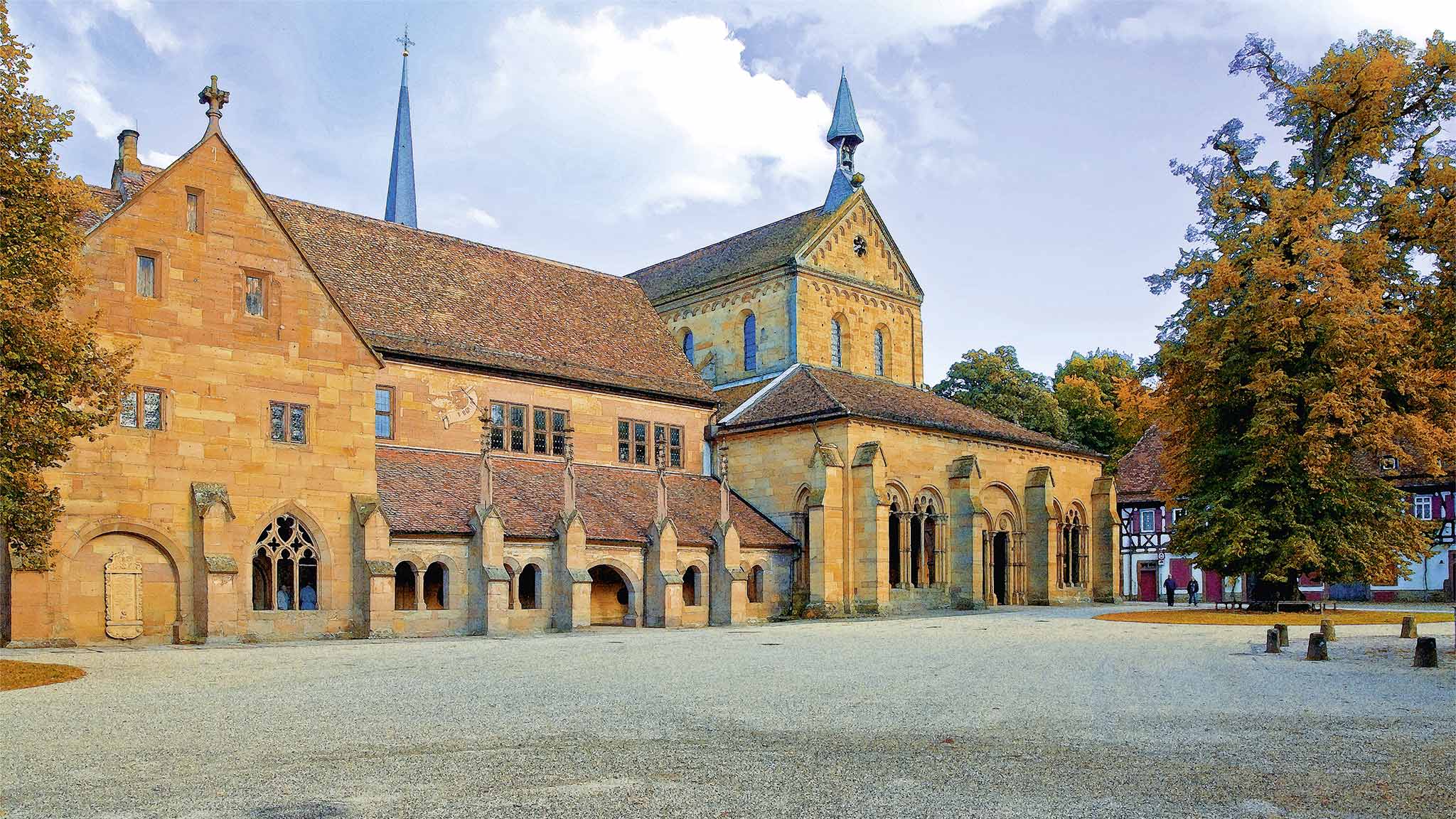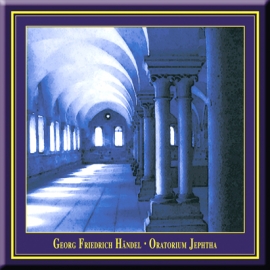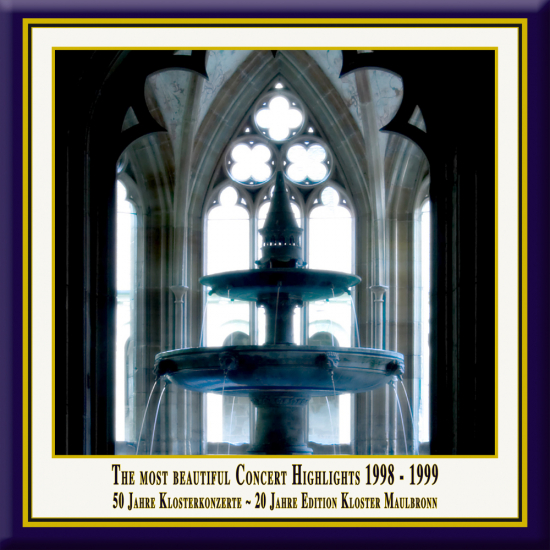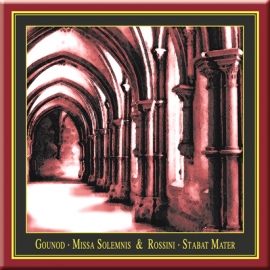Vol. 01: The most beautiful Concert Highlights 1998-1999
Track
The most beautiful Concert Highlights
from Maulbronn Monastery 1998-1999
The 50th Anniversary of the Maulbronn Monastery Concerts
Anniversary Series, Vol. 1
Highlights from:
George Frideric Handel: Jephtha, HWV 70 (September 26 & 27, 1998)
Charles Gounod: Messe solennelle de Sainte-Cécile, CG 56 (June 12 & 13, 1999)
Gioacchino Rossini: Stabat Mater, IGR 67 (June 12 & 13, 1999)
Live recordings from the church of the UNESCO World Heritage Site Maulbronn Monastery
HD Recording · DDD · Duration: c. 80 Minutes
Digital Album (here: MP3/320kBit/sec.) · 16 Tracks · incl. Digital Booklet
MP3 Album
320 kBit/sec.



W
e have been documenting for 20 years the concerts in the UNESCO World Heritage Maulbronn Monastery. The concerts supply the ideal conditions for our aspirations. It is, above all, the atmosphere of the romantic, candle-lit arches, the magic of the monastery in its unadulterated sublime presence and tranquillity that impresses itself upon the performers and audience of these concerts. Renowned soloists and ensembles from the international arena repeatedly welcome the opportunity to appear here - enjoying the unparalleled acoustic and architectural beauty of this World Heritage Site, providing exquisite performances of secular and sacred music, documented by us in our Maulbronn Monastery Edition.
Josef-Stefan Kindler & Andreas Otto Grimminger, K&K Verlagsanstalt

JEPHTHA by George Frideric Handel (1685-1759)
Jephta was Handel's last work of great dimensions. It was written in 1751 in London. It was performed for the first time at Covent Garden at february, 26. in 1752. Händel's last dramatical work was in the same time the most poetic of his oratories. The tension is not created by action but by the inner aspect of Jephta's unsolvible solitude. Expelled from Gilead by his half-brothers, he grows up in exile and becomes a godfearing army commander, while Gilead is suppressed by the Ammonites. After 18 years of slavery, the eldest of Gilead ask Jephta to free them from their tyrants. As army commander, Jephta swears his god Jehova to sacrifice to him the first creature he will meet after victory. He can't see that it's his own daughter Iphis to take this burdon upon her shoulders. The desperation of Jephta, mother Storge and lover Hamor is met by the courage of Iphis, who comes to show herself as a true heroine. The tragical conflict of the sacrifice of his own daughter is turned to a good end, inspite of the outlines of the old testament. The music is of an overwhelming forcefulness and beauty. Jephta's importance is based in the first place on the imposing choir scenes. The choir has double function: at one hand he takes part in action actively, on the other hand he stays in the backround and comments on the story. Jephtha is the illegitimate son of the Israelite leader, Gilead. On Gilead's death (over eighteen years before the action begins) Jephtha was scorned and thrown out of Israel by his half-brothers. He has been living in Tob with his wife, Storgè, and their daughter, Iphis, who was born in exile. Soon after Jephtha's exile the Ammonites attacked Israel and began a long and bitter war.
Act One: The Israelites have been at war with the Ammonites for the past eighteen years. All their military leaders have been killed, and the people have begun to turn away from Jehovah and worship false gods. In desperation they ask the exiled Jephtha to return and lead their forces in a final offensive against the Ammonite occupation. Jephtha agrees to lead the army on condition that he is allowed to lead the country if he wins the battle. The Israelites, led by Jephtha's half‑brother, Zebul, agree to his demand. He says goodbye to his wife and daughter. Iphis then says goodbye to the Israelite, Hamor, to whom she is engaged and who will fight alongside her father in the forthcoming battle. Jephtha is worried about the outcome of the battle and privately makes a deal with God: if he returns victorious, he will sacrifice the first living thing that he sees on his return. Meanwhile his wife is afraid that some misfortune will happen, and is comforted after a nightmare by her daughter and servants. Jephtha, who has failed to secure a peace by treaty, prepares his Israelite forces for the battle.
Act Two: Hamor informs Iphis of her father's victory, and describes the miracle of the battle, in which an army of angels signalled the enemy's defeat. She asks her servants to prepare to welcome her father back. Jephtha returns triumphant and commends the bravery of his officers, Zebul and Hamor, but says that God deserves the real credit for the victory. Iphis then appears unexpectedly to greet her father with her servants. Jephtha is horrified to realize that it his daughter who is the subject of his rash promise to God. He is forced to tell everyone of his vow, and all try to persuade him to change his mind. He refuses. Iphis herself convinces him that she will go ahead with the with the sacrifice for the sake of her country and family. The community wrestles with the nature of the goodness of a God who asks for the murder of a child.
Act Three: Jephtha, his wife and the community prepare for Iphis's sacrifice. She is very frightened and says goodbye to everyone. The whole community appeals to God for guidance. Just as Iphis is being dragged off to her death an angel appears and forbids the sacrifice to proceed: Iphis must dedicate herself to a life of chastity and the service of God. Jephtha and the community thank God for sparing Iphis's life. Storgè and her servants prepare for Iphis to leave. lphis and Hamor say a final goodbye to each other. Everyone tries their best to rejoice at the happy and strange end to their troubles, and the peace which Jephtha's military leadership has secured.
This live recording of Handel's Jepthta is part of a cycle of oratorios and masses, performed in the basilica of Maulbronn Abbey under the direction of Jürgen Budday. The series combines authentically performed oratorios and masses with the optimal acoustics and atmosphere of this unique monastic church. This ideal location demands the transparency of playing and the interpretive unveiling of the rhetoric intimations of the composition, which is especially aided by the historically informed performance. The music is exclusively performed on reconstructed historical instruments, tuned in the pitch, which was customary during the composer's lifetime (this performance is tuned in a' = 415 Hz).
MESSE SOLENNELLE DE SAINTE-CÉCILE by Charles Gounod (1818-1893)
Charles Gounod has become famous for his opera "Margarete" above all. It is hardly known that his first passion was clerical music. The "Messe solennelle de Saint-Cécile" is worth to be called the most beautiful among his numerous clerical compositions. The work is distinguished by a maze of marvellous melodies, an extremly lined-up orchestra and the harmonious interconnection of solists and choir. The first staging of the mass was in November, 22. 1855 at St. Eustache in Paris. Gounod wrote the work for the celebration of St. Cecile, who is the patroness of clerical music. With certain instinct he combined the dramatic counterparts of clerical music and motifs and melodies of the Grand Opera. The plain covering figures of the orchestra above all give a uniform mood to the sets of the mass, which manifests itself in sacral dignity.
STABAT MATER by Gioacchino Rossini (1792-1868)
Heinrich Heine described Ronssin's Music as "deeply experiences and yet naive, adequate to the enormous martyrdom but in the same moment childlike". He felt gracefulness within the very terror and thus understood its visionary character. Only after his carrer as an opera composer, Rossini turned to clerical music. In his compositions he used to mix up traditionel stiles with opera-like gesture to mark the dramatical content of the lyrics. According to the Italian tradition of clerical music Rossine devided the mediaeval sequenz of "Stabat Mater" clearly into solo- and ensemble-sets. The "Stabat Mater" covers as well opera-like as traits of clerical music: sweeping melodies and drifting rhythms combine with sections, composed in old stile.
P
ublishing Authentic Classical Concerts entails for us capturing and recording outstanding performances and concerts for posterity. The performers, audience, opus and room enter into an intimate dialogue that in its form and expression, its atmosphere, is unique and unrepeatable. It is our aim, the philosophy of our house, to enable the listener to acutely experience every facet of this symbiosis, the intensity of the performance, so we record the concerts in direct 2-Track Stereo digital HD. The results are unparalleled interpretations of musical and literary works, simply - audiophile snapshots of permanent value. Flourishing culture, enthralling the audience and last but not least also you the listener, are the values we endeavor to document in our editions and series.
The concerts at the UNESCO World Heritage Maulbronn Monastery supply the ideal conditions for our aspirations. It is, above all, the atmosphere of the romantic, candle-lit arches, the magic of the monastery in its unadulterated sublime presence and tranquillity that impresses itself upon the performers and audience of these concerts. Renowned soloists and ensembles from the international arena repeatedly welcome the opportunity to appear here - enjoying the unparalleled acoustic and architectural beauty of this World Heritage Site, providing exquisite performances of secular and sacred music, documented by us in our Maulbronn Monastery Edition.
Andreas Otto Grimminger & Josef-Stefan Kindler, K&K Verlagsanstalt
George Frideric Handel (1685-1759):
Jephtha
The English Oratorio HWV 70,
performed according to the traditions of the time
by the Maulbronn Chamber Choir
and the Monastery Baroque Orchestra,
conducted by Jürgen Budday
on September 26 & 27, 1998
Words by Thomas Morell
1. Overture [4:18]
2. Act 1: It must be so - Pour forth no more [4:45]
Accompagnato & Air of Zebul
Soloist: Stephen Varcoe (Bass)
3. Act 1: No more to Ammon's god and king [3:12]
Chorus of Israelites
4. Act 1: Dull delay, in piercing anguish [3:53]
Air of Hamor
Soloist: Charles Humphries (Countertenor)
5. Act 2: In glory high, in might serene [3:10]
Chorus
6. Act 2: Why is my brother thus afflicted? [1:09]
Recitative of Zebul
Soloist: Stephen Varcoe (Bass)
O Zebul, Hamor and my dearest wife
Recitative of Jephtha
Soloist: Julian Podger (Tenor)
7. Act 2: First perish thou - Let other creatures die [2:27]
Accompagnato & Air of Storgè
Soloist: Melinda Paulsen (Mezzo-Soprano)
8. Act 3: Waft her, angels, through the skies [3:23]
Air of Jephtha
Soloist: Julian Podger (Tenor)
9. Act 3: Ye house of Gilead, with one voice [3:31]
Chorus of Israelites
Charles Gounod (1818-1893):
Messe solennelle de Sainte-Cécile, CG 56
performed by Svetlana Strezeva (Soprano),
Willi Stein (Tenor), Nikita Storojev (Bass),
the Maulbronn Cantor Choir
and members of the SWR-Symphony-Orchestra Baden-Baden & Freiburg,
conducted by Jürgen Budday
on June 12 & 13, 1999
10. Kyrie: Kyrie eleison, Christe eleison [5:17]
for Soloists (STB), Choir and Orchestra
11. Credo: Credo in unum Deum [12:59]
for Soloists (STB), Choir and Orchestra
12. Offertorium [3:39]
for Orchestra
13. Agnus Dei: Agnus Dei qui tollis peccata mundi [5:02]
for Soloists (ST), Choir and Orchestra
Gioacchino Rossini (1792-1868):
Stabat Mater, IGR 67
performed by Svetlana Strezeva (Soprano),
Jolanta Michalska-Taliaferro (Mezzo-Soprano),
Willi Stein (Tenor), Nikita Storojev (Bass),
the Maulbronn Cantor Choir
and members of the SWR-Symphony-Orchestra Baden-Baden & Freiburg,
conducted by Jürgen Budday
on June 12 & 13, 1999
14. Introduzione: Stabat Mater dolorosa [10:04]
for Soloists (SSTB), Choir and Orchestra
15. Quartetto: Sancta Mater, istud agas [6:44]
for Soloists (SSTB) and Orchestra
16. Finale: In sempiterua saecula. Amen. [6:16]
for Soloists, Choir and Orchestra
Sound & Recording Engineer: Andreas Otto Grimminger
Mastering: Andreas Otto Grimminger & Josef-Stefan Kindler
Photography: Josef-Stefan Kindler
Artwork & Coverdesign: Josef-Stefan Kindler





